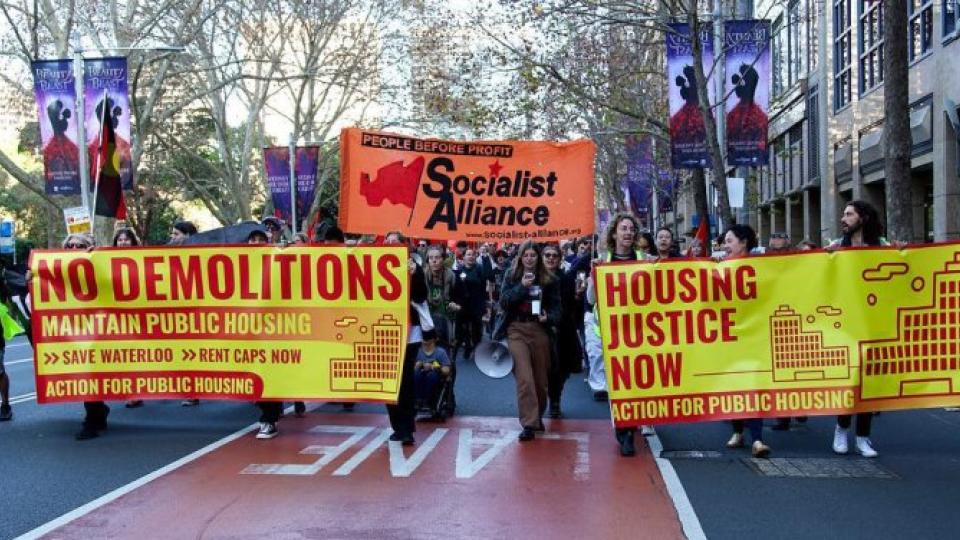Why we need a parliament of the streets

After just a year in office, the initial optimism surrounding Labor’s election is waning. Anthony Albanese’s popularity is down from an approval rating of 47% in February to 36% in June.
Albanese’s style may be different, but his government is still waving through new coal and gas mines, refusing to take the housing affordability crisis seriously and throwing hundreds of billions of dollars to machines of war.
It took more than 100 years for working people to win the right to vote. Before then, there was a property qualification. Britain and its colonies were capitalist democracies, not just in a general sense but because only the rich could vote.
This struggle posed a challenge for the capitalist class: how to ensure governments continued to serve their interest, while pretending to rule for everyone? Pulling this off is the art of modern politics.
Since Labor was founded in 1901, it has always promoted a fantasy where workers and big business pull together and everyone gets a fair slice of the pie.
In times of crisis, such as war and depression, Labor has been the more reliable manager because it can better restrain the union and social movements in the name of the “national interest”.
While anti-working class policies in the United States and Britain — neoliberalism — were introduced by the crusading conservatives Ronald Reagan and Margaret Thatcher, in Australia the unions were too strong and a frontal assault risked a backlash.
Instead, Bob Hawke and Paul Keating went to work using the infamous Prices and Incomes Accord which whittled away wages, rights and the welfare system.
Labor governments owe their first loyalty to capitalism, not to their own party or working people. The AUKUS deal is a good example. Hammered out in secret meetings between Liberal and Labor frontbenchers with US and British defence officials, it was not even discussed by Labor’s parliamentary caucus. It was not taken to an election, despite the staggering amount of public funds being handed over to a military project aimed at “containing” China.
Labor functions as the sugar coating on the poison pill of Australian capitalism. But it can only do that if there is no credible left alternative. Any left challenge to Labor is a threat.
This explains Labor’s furious reaction to the Greens refusal to pass its Housing Australia Future Fund bill, even after Albanese threw in the one-off $2 billion for social housing. The corporate media has dutifully joined the attack, instructing the Greens to not “let the perfect be the enemy of the good”.
Greens federal leader Adam Bandt told supporters on June 10: “Only in a shared minority government can we get the action we need on climate, and on housing and inequality. Thankfully as you know, we already hold the balance of power in the Upper House (Senate). To actually make laws, we need to hold the balance of power in the Lower House as well” [bold in original].
To imagine the “balance of power” would be enough to get key Greens policies implemented is wishful thinking.
The actual balance of power is the combined vote of Labor and Liberal MPs. Hankering to become the junior partner in a Labor government could be a death warrant.
A more likely stepping stone to forcing the change we need would be if a sufficiently large block of Greens and other MPs supporting real action on climate and housing dedicate serious resources to building the extra-parliamentary movements for change.
To get “the action we need on climate”, as Bandt put it, we will need to build the extra-parliamentary movements on a scale like we have never before seen, not just seek a majority in parliament.
On Labor’s inadequate climate “safeguard mechanism”, Greens MPs said negotiating with Labor was like dealing with the fossil fuel companies. Yet they supported it and copped criticism for doing so.
Missing were any mass protests backing the climate movement’s demand for no new coal or gas, which the Greens could have initiated with the climate movement. Doing so could have mobilised that part of Labor’s base which wants real action, adding further pressure.
But there’s a tendency in the Greens leadership to agree that real change needs “street heat” to put pressure on Labor, but to also see that as someone else’s job.
In the battle over Labor’s housing bill, the Greens are at least attempting to mobilise their own base. But, like sections of Labor did in the 1980s around anti-nuclear and anti-war concerns, the Greens need to devote serious resources to helping build independent extra-parliamentary movements.
The more ambitious Greens policies on housing, climate and inequality will not be won in the halls of Parliament House. They will only be won by sustained mobilisations — a parliament of the streets. That would give people real reason for hope, and point the way to a more fundamental transformation of society.
[Sam Wainwright is a co-convenor of Socialist Alliance.]